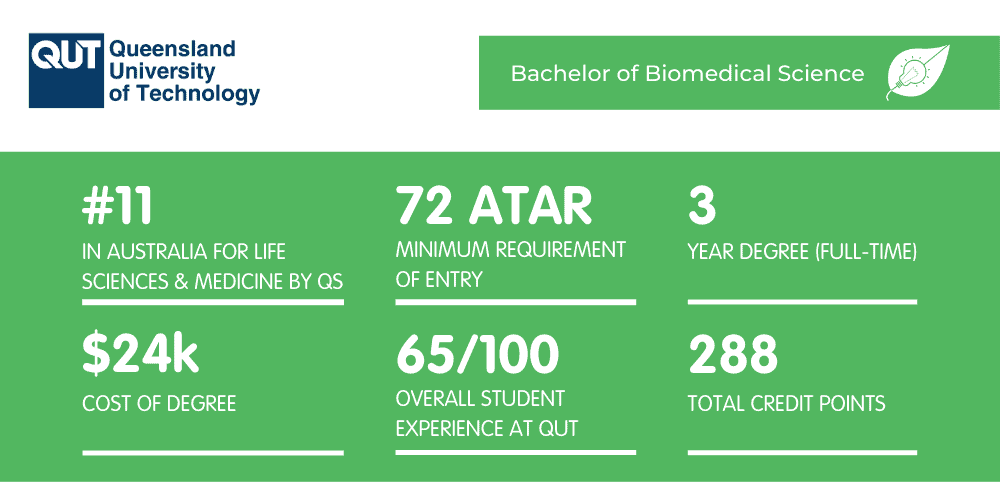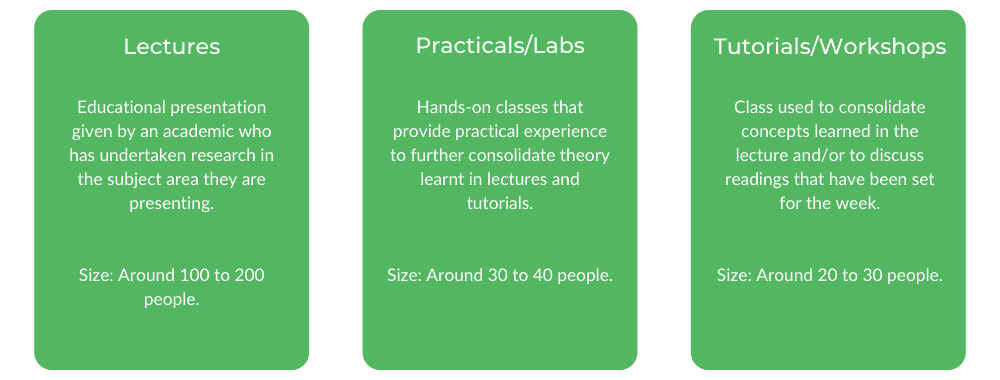Interested in studying a Bachelor of Biomedical Science at the Queensland University of Technology (QUT)?
We’ve got everything you need to know about it in this article, including the degree outline, career pathways, majors and faculty culture.
So what are you waiting for? Let’s get started!
What is a Bachelor of Biomedical Science at QUT?
Core Units and Majors
How to Get into a Bachelor of Biomedical Science at QUT
What’s the Teaching Format?
What’s the Faculty and Culture Like?
What is a Bachelor of Biomedical Science at QUT?
Biomedical Science at QUT is a great practical and flexible degree that can be paired with a wide array of majors, as well as combined with business, law or mathematics in a double degree. Students get the opportunity to engage in practical learning from first year, entering into simulations and real clinical settings.
Biomedical scientists work in areas such as vaccine and antibiotic development, which are key fields of research in the modern world. You’ll study the functions of the body and how disease and injury can impact this and how it should be treated.
Honours
You can also do an Honours year for Biomedical Science where you further your practical and research-based knowledge, to ready you for professional employment. You’ll work in research groups, further your analytical skills and your independence as a scientist.
To complete an Honours program in Biomedical Science, you need to have completed your degree with a minimum GPA of 5.00, over the final 2 years, as well as having chosen an appropriate honours topic and a suggested honours supervisor.
You can find more information here!
Career Paths
Graduates from this degree are equipped to work for universities, hospitals, research institutes and biotechnology companies in Australia and around the globe. It’s also an expanding career field, with new opportunities in science journalism, consultancy and the development and marketing of treatment products.
The degree also provides a great base for postgraduate studies in medicine and allied health. For those that choose to do a clinical physiology minor, you can also work as a sleep scientist, cardiac scientist, respiratory scientist or neuroscientist.
Career options include:
- Biochemist
- Biomedical Laboratory Officer
- Biomedical Science Researcher
- Biotechnology Scientist
- Cardiac and Vascular Scientist
- Health Researcher
- Laboratory Assistant
- Laboratory Technician
- Medical Equipment Sales
- Medicine (after further study)
- Scientist
For clinical physiology minors, you may end up working as a:
- Neurophysiologist
- Reproductive Technician
- Respiratory Scientist
- Sleep Scientist
If you’re interested in further study in Medicine check out the Top 5 Medical Schools in Australia.
Core Units and Majors
What are the Core Units?
In first year you have to complete 8 biomedical science core units, equal to 96 credit points. Though in second and third year, that’s where you get to start choosing which units to study as well as study areas to focus on.
You can learn more about the course structure here!
The first-year core units give students a background in each of the potential specialisations that they choose from in their second year. These units include:
- Introduction to Biomedical Science: This sets you up with foundational knowledge about the field, and helps you learn scientific literacy, communication, and ethics.
- Human anatomy: You’ll learn anatomical language to help you communicate the theory and learn some practical skills.
- Human Cell and Molecular Biology: This unit gives you an insight into the basic principles of cell biology, genetics, and molecular biology. There’s a major focus on how to use and understand microscopes.
- Foundations of Biochemistry: You’ll be equipped with an introductory understanding of biochemistry.
- Principles of Human Physiology: You’ll learn laboratory skills in physiological measurements and data analysis.
- Genes, Genomes, and Genetics: In this unit, you’ll gain an understanding of inherited diseases and how DNA and RNA function.
- Principles of Infection and Immunity: This subject looks at pathogenic organisms and immune mechanisms.
- Quantitative Skills for Health Scientists: You’ll learn foundational knowledge necessary to pursue a career in biomedical sciences, like numerical literacy and quantitative skills.
What are the Majors?
Biomedical Science at QUT allows you to specialise in these areas of study:
- Anatomical sciences
- Cell and molecular biology
- Human biochemistry
- Human physiology
- Infectious diseases
- Indigenous knowledges as a study area
Our interviewee, Bianca, studied a major in human physiology which was compulsory for entry into the clinical physiology minor she completed as well.
“The QUT Human Physiology major, in conjunction with the QUT Clinical Physiology minor, allowed for opportunities to gain and improve upon the hard skills (theoretical application, abstract reasoning) and soft skills (team player, collaborator, clear communicator) required within the medical and clinical field.” — Bianca Monzon, Bachelor of Biomedical Science (Human Physiology, Clinical Physiology and Anatomical Sciences) Graduate at QUT
Internships
There are great internship units, these being Biomedical Work Integrated Learning A and B. These internship placements can be in both research and clinical industries.
Work Integrated Learning staff organise the internships for you and give support before, during and post-internship. Full-time students complete 240 hours interning and get to apply the skills they learn to real-life situations and workplaces.
How to Get into a Bachelor of Biomedical Science at QUT
The lowest selection rank to receive an offer for Biomedical Science at QUT is 72 and students with an ATAR of 93 are guaranteed an offer.
You can get receive adjustments to your selection rank through schemes such as the Education Access Scheme, Elite Athlete Entry Scheme and the Year 12 Subject Scheme. QUT has more information on how to apply with these schemes here.
Assumed Knowledge
When studying this degree, it is assumed you have sound knowledge in these subjects:
- Biology or Chemistry
- English, or Literature, or English and Literature Extension, or English as an Additional Language
- Mathematical Methods or Specialist Mathematics
Though, if you haven’t studied these subjects in high school, you are encouraged to enrol in bridging courses.
Scholarships
QUT has a lot of scholarships on offer for students with financial difficulties, Indigenous backgrounds, residing in regional or remote Australia, or have athletic abilities.
For STEM students in particular, the STEM Scholars Academic Scholarship is a great opportunity for future students. To be eligible, you need to receive an ATAR of 92-99.95 and have participated in a STEM camp or a high school STEM internship, as well as be enrolling in the Faculties of Engineering, Science or Health.
You can receive a scholarship worth $3,000. As part of this scholarship, there’s also a relocation bursary available to those who attended school outside the southeast Queensland catchment. More details are available here.
What’s the Teaching Format?
QUT teaches across two semesters each year, with full-time students traditionally completing 4 classes each semester. For Biomedical Science students, units consist of 1 lecture or weekly online module (1-2 hours), 1 practical/laboratory and 1 tutorial or workshop per week.
Contact hours usually end up being 4 minimum and 5-6 maximum hours per unit, which can end up being up to 24 hours at university per week!
Class Structure
Lectures
Lectures are available to students both live and recorded and most lecturers share slides before the lecture. They focus on a different overarching topic each week, which is then further dissected and elaborated on in pracs and tutorials.
The entire cohort attends the lecture, with this usually being roughly between 100 to 200 students.
“My study tip is to print 4-6 slides to a page and annotate during the live lecture.” — Bianca Monzon
Practicals/Labs
Practicals/laboratories are not recorded and students are expected to attend every one of them they are scheduled to attend. These are much more exciting than the lectures, as they go beyond theory and look into its application instead.
Body-based units like physiology and anatomy give you the opportunity to use cadaveric material and Anatomage which is a touch-screen 3D life-sized image of a human body. These classes are a lot more hands-on and usually have between 30 to 40 students.
Tutorials/Workshops
Workshops and tutorials happen once weekly and reinforce the content you learn in the lecture.
They’re usually held in a classroom and are a great chance to ask any questions you have about your weekly content. There are usually 20 to 30 students in a tutorial.
Assessments
Each unit is made up of 3-4 graded assessments of various weightings. They often take on the form of essays, group work, practical assessment, theory examinations or objective structured clinical examinations (OSCE).
OSCEs assess your ability to work in the field of health sciences, taking into account your knowledge and skill level. You complete the exam in a clinical setting and carry out scenarios that could fit into that setting.
Skills You Refine and Learn
Studying biomedical science at QUT puts you in a great position to either enter the workforce or pursue further studies. With units focused on work-integrated learning and preparing you for real life situations, you’ll feel confident and capable in a professional position.
What’s the Faculty and Culture Like?
There is a great culture in the QUT School of Biomedical Science. The staff are very supportive, and many are leading researchers from the Institute of Health and Biomedical Innovation, the Translational Research Institute, and partner research facilities at major Brisbane hospitals.
There is also the Biomedical Science Society at QUT, BiOMS, which holds regular events such as an annual ball, drinks nights, networking events and GAMSAT study sessions.
“Achievement highlights include the highest number of sponsorships (over 30 sponsors and 50 membership benefits), highest annual membership rate, highest event/s interest and attendance, highest student engagement, and increased faculty and industry liaison.” — Bianca Monzon
Mentorship programs
QUT has an excellent Career Mentor Program, which pairs students with mentors from the industries they’re interested in. Mentors volunteer half an hour each fortnight to supporting student mentees in finding their career pathway.
The mentor program is available to students who have completed at least 96 credit points and have a GPA of 4.0 minimum. To find out more about the program, click here.
Elizabeth Noonan is a Content Writer for Art of Smart and an undergraduate student at the University of Sydney. There, she studies a Bachelor of Arts/Advanced Studies, majoring in Media and Communications and French. Elizabeth is a huge movie buff and hopes to go into journalism after she finishes her degree.






